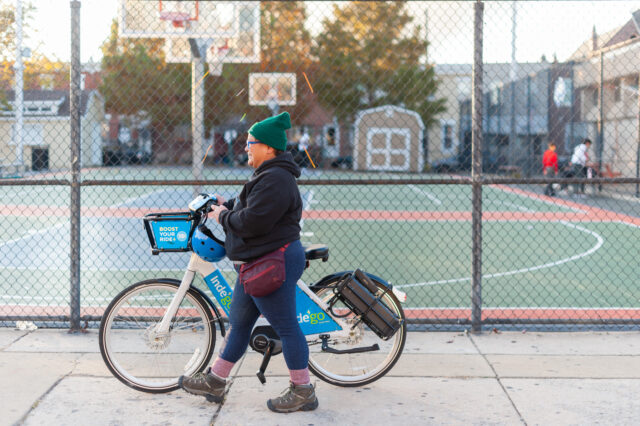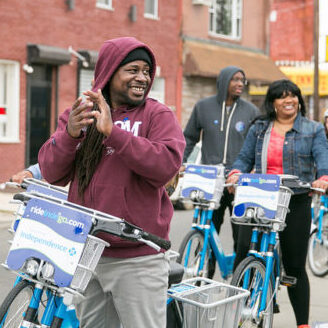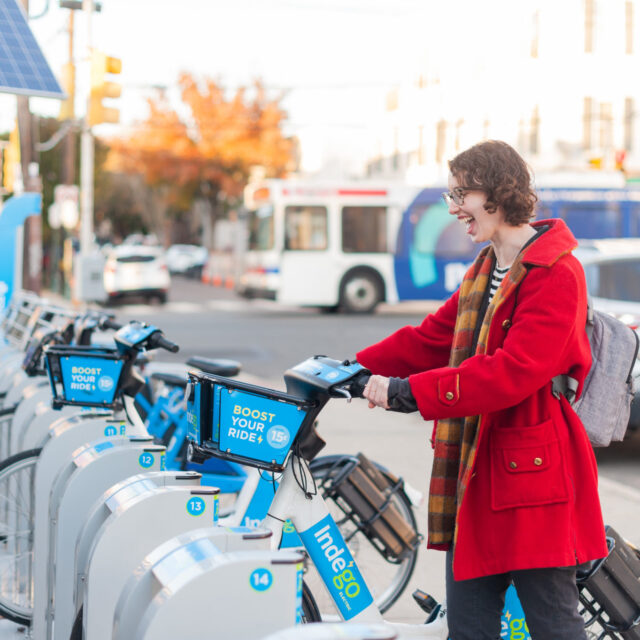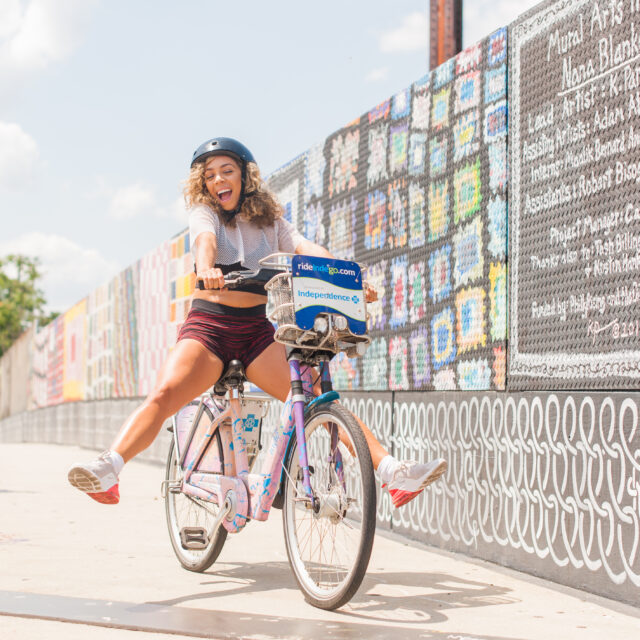BBSP Grantees Continue to Build Equity
by Tangier Barnes Wright, Deputy Director of Shared Micromobility
January 9, 2023
Two years in, our five living labs have made considerable progress on their respective projects, continuing to engage underserved communities around bike share.

Photo credit: Jasmine Alston Photography
What is a “Living Lab”? It’s a place where innovation happens. For BBSP, this means places where tactics and strategies for making bike share more equitable are tested, with the ultimate hope that these tactics will eventually be replicated elsewhere to make our industry better as a whole.
The BBSP Living Labs program was created to build on the work of Philadelphia, the original BBSP Living Lab city. In 2020, we decided to expand our funding to include four additional cities and in January 2021, our five Living Lab grantees were selected. From the outset, each was chosen for a unique pilot project meant to address a specific barrier to the access and use of shared micromobility in low-income communities of color.
For two years now, our grantees have come together as a cohort for monthly group calls, sharing learnings, talking through issues, and building camaraderie around a shared vision from coast to coast. While reflecting on 2022 and our Living Labs program, two things stood out: 1) the “living” part of our Living Labs is quite literal and 2) creating and supporting an engaged, passionate, and visionary group of people results in an effective and functional cohort.
Our grantees are going through the motions of testing strategies and tactics based on the needs and desires of those who use their bike share systems, as well as those they’d like to draw into the fold. In 2022, there were times when grantees had to pivot. When programming wasn’t working quite as intended, they kept their labs alive by trying something different. In many cases, this resulted in new and unexpected community partnerships. Another lesson: It’s important to remain nimble, especially when it comes to serving the needs of BIPOC, youth, and lower-income communities.
Initially, our Living Lab in Portland, Oregon, was only going to work with community health centers for its Prescribe-a-Bike program. In 2022, however, it initiated a strong partnership with local high school health centers to recruit young riders for the pilot. They reached their target number of participants for the program sooner than expected, allowing them to focus on direct outreach to participants to better support them and understand their riding habits.
In Detroit, MoGo bike share began testing solutions to common bike share barriers after hearing from community members. The system introduced a new way for users to pay with cash and they initiated a study to determine where they should relocate stations to better connect with more potential riders. Though its end goal remains integrating bike share with transit, MoGo developed different methods in response to research and ongoing resident feedback.
In Cincinnati, Red Bike successfully engaged youth throughout the summer on bike share rides and established an important partnership with Shelterhouse, an organization serving people experiencing homelessness. Within just a couple of months of launching a bike share station at Shelterhouse (in response to community wishes), the station saw 210 rides per day. The station, which almost exclusively serves those using Red Bike’s equity access pass, quickly became the fifth most-used station in the system. It’s a great example of how community-based partnerships are critical to the success of bike share and how bikes are critical to expanding people’s mobility options.
The Northwest Center in Chicago continued to dig deep into mobility issues with its local youth. Youth transit ambassadors engaged their neighbors, peers, and elected officials in a series called “Pump The Brakes.” A weekly, virtual community of residents, the series brought together the Chicago Department of Transportation, DIVVY Bike Share, local alderman, bicyclists, and drivers, focusing on key transportation issues, like how to share the road and interact with new bicycle infrastructure. It provided a platform for residents to talk to each other about why they choose a given form of transportation and was a great example of how to engage local decision-makers around community issues.
In Philadelphia, Indego Bike Share launched and completed its second Wheels to Work program, which taught participants how to use bike share while also learning about the job market, networking opportunities, and appropriate work attire. Seeing a need to expand outreach to and participation among Spanish-speaking populations, Indego also worked to build stronger partnerships with community centers, Spanish-serving organizations, and the Free Library of Philadelphia in 2022. This is just the type of equity work that helps create better access to and increase the use of bike share in communities that are often left out of mobility conversations.
Reflecting on all five grantees over the last year, something that came to light for me is how our unique, partnership-based approach to grant-making results in positive outcomes and lasting relationships. Our relationship with grantees resembles a mentor-mentee relationship: Sometimes BBSP is the mentor, and sometimes we are the mentee, meaning that we’re often learning from one another and constantly working as a team to make the industry better. It is a privilege to be a partner to these organizations and as a funder, I am excited to help elevate their work.
Our current round of Living Labs will come to a close at the end of June. At that time, we’ll have a comprehensive program evaluation to share out. Until then, consider applying for a mini-grant (the next round will open in March), and make sure you’re signed up for our newsletter, where we’ll have more stories chronicling the detailed ways our grantees are influencing the bike share industry.
The Better Bike Share Partnership is funded by The JPB Foundation as a collaboration between the City of Philadelphia, the National Association of City Transportation Officials (NACTO) and the PeopleForBikes Foundation to build equitable and replicable bike share systems.



